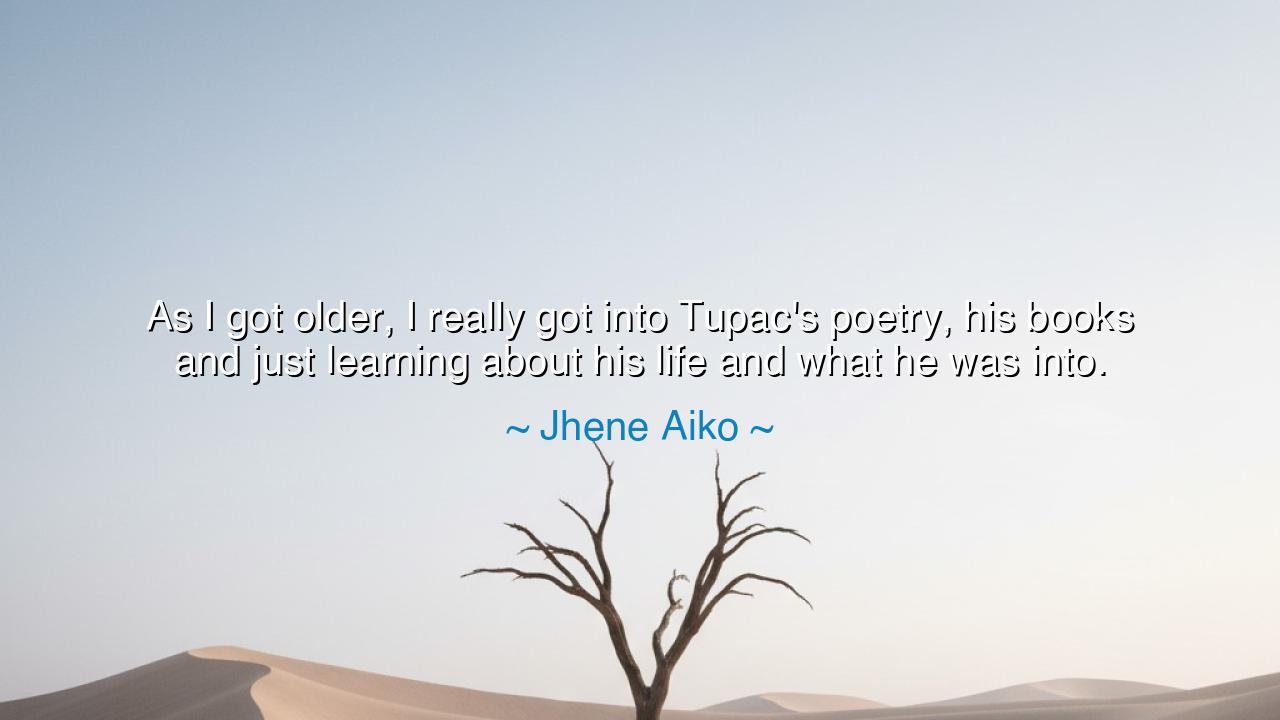
As I got older, I really got into Tupac's poetry, his books and
As I got older, I really got into Tupac's poetry, his books and just learning about his life and what he was into.






“As I got older, I really got into Tupac’s poetry, his books, and just learning about his life and what he was into,” said Jhene Aiko, an artist whose voice flows like water and whose spirit seeks depth beyond the glitter of fame. Her words are not merely about admiration — they are about awakening. They speak of that sacred moment in one’s life when the soul begins to hunger for wisdom, when music ceases to be mere sound and becomes scripture, when art ceases to entertain and begins to teach. For what she found in Tupac’s life was not only rhythm and rebellion, but truth — truth born of pain, struggle, and transcendence.
As a young woman, Jhene Aiko grew up in the storm of modern sound — where beats often drown out meaning, and melody floats lightly above the depths of thought. But as she got older, as the tides of time sculpted her own soul, she turned inward, seeking what endures. It was then that she encountered Tupac Shakur, not as the defiant figure the world painted, but as the poet — the wounded philosopher who carved beauty from chaos. His verses were not just lyrics, but living confessions; his words, not mere protest, but prayer. Through him, she discovered that the artist’s truest work is not to perform, but to reveal — to make visible the unseen emotions of a generation.
Tupac’s poetry was a bridge between anger and compassion, between fire and tenderness. In books like The Rose That Grew from Concrete, he revealed that even from the harshest soil, beauty can rise. Jhene, in learning about his life, learned too the sacred paradox of the artist — that to create truth, one must endure suffering; to speak for others, one must first listen to the silence within. She saw in him the same struggle that lives in every soul that seeks light in a darkened world. His defiance was not rage, but love in armor. His rebellion was not destruction, but the cry of a heart refusing to be numb.
There is an ancient kinship between seekers of different generations. As the disciples once studied the words of prophets long gone, Jhene found in Tupac’s works a teacher whose lessons echoed beyond death. His voice, though silenced in body, lived on in spirit — a reminder that the human heart, once lit by purpose, can never be extinguished. This is the power of art that springs from truth: it becomes eternal, crossing time to awaken those not yet born when the words were first spoken. She became, in her own way, both student and continuation of that lineage of honest expression.
Consider the philosopher Marcus Aurelius, who centuries ago wrote meditations to himself — words of reflection that would one day guide millions. He never knew the reach of his thoughts, yet they endured, just as Tupac’s writings have endured. Both spoke from the depths of their experience — one an emperor, the other a poet of the streets — yet their wisdom shares a common pulse. And so Jhene’s discovery of him mirrors humanity’s endless cycle of rediscovery: every age must find its own teachers, and every soul must learn anew that greatness lies not in image, but in insight.
Her words also carry a quiet truth about growth. When she says, “As I got older,” she reminds us that wisdom is not given but earned. Youth may thrill in rhythm and rebellion, but maturity seeks meaning. To “get into Tupac’s poetry” is to step beyond the noise of the world and listen to the music of understanding. It is to realize that even the fiercest voice carries tenderness beneath it, that even the rebel prays in his own way. This is the evolution of the artist — to move from hearing to feeling, from admiring to understanding.
Thus, the lesson that flows from Jhene Aiko’s reflection is clear: seek depth in all things. When you admire another, do not only see their fame — study their life, their struggles, their dreams, their wounds. Learn not only their songs, but their silences. Read their words as if they were ancient texts, for every artist who lives with truth becomes a vessel of timeless wisdom. Let their pain teach you empathy; let their resilience awaken your own courage.
So, my listener, remember this: the journey of the soul is one of learning — not merely what is new, but what is eternal. Like Jhene Aiko, open your heart to the voices of those who came before, for they have walked paths that echo your own. In every poem, in every song, in every life well lived, there are clues left behind by those who sought meaning in the chaos. Follow them. Listen deeply. And in time, you too will speak in your own poetry, adding your voice to the great and endless conversation of the human spirit.






AAdministratorAdministrator
Welcome, honored guests. Please leave a comment, we will respond soon